Ditapis dengan

Implementasi Pembiayaan Berkelanjutan di Negara Berkembang : Pengalaman Indon…
Buku ini mengkaji implementasi pembiayaan berkelanjutan di negara berkembang dengan fokus Indonesia, membahas kebijakan, praktik sektor keuangan, tantangan, serta peran institusi dalam mendukung pembangunan berkelanjutan.
- Edisi
- Cet. 1
- ISBN/ISSN
- 9786020659435
- Deskripsi Fisik
- ix, 250 hal; 24 cm
- Judul Seri
- -
- No. Panggil
- 332.042 LES i
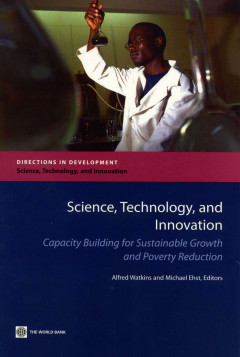
Science, technology, and innovation
A strong and dynamic capacity in science, technology, and innovation (STI) can no longer be seen as a luxury that is suitable only for wealthier, more economically powerful countries. Rather, if developing countries hope to prosper in the global economy, and if world leaders expect globalization to foster sustainable development and to reduce poverty, STI capacity building is an absolute necess…
- Edisi
- -
- ISBN/ISSN
- 978-0-8213-7380-4
- Deskripsi Fisik
- xxii,211 hal. : il. ; 23 cm.
- Judul Seri
- -
- No. Panggil
- 338.927.091.724 SCI

Minding the gaps
By integrating their poverty reduction strategies (PRSs), national budgets, and the corresponding reporting processes, low-income countries can strengthen domestic accountability and the implementation of pro-poor policies. Minding the gaps, based on nine low-income-country case studies and a review of relevant experience in four higher-income countries, offers practical insights for donors and…
- Edisi
- -
- ISBN/ISSN
- 978-0-8213-7205-0
- Deskripsi Fisik
- xii,182 hal. : il. ; 23 cm
- Judul Seri
- -
- No. Panggil
- 362.5’56109172 MIN
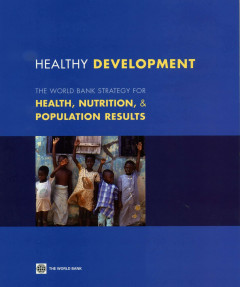
Healthy development
Updates the bank’s contribution to improving health outcomes, including the 2015 millennium development goals, at a time when new and existing multilateral organizations, bilateral partners, and foundations are increasing their commitment to global health. Achievements in health, nutrition, and population have important implications for overall country fiscal policy and country competitivenes…
- Edisi
- -
- ISBN/ISSN
- 978-0-8213-7193-0
- Deskripsi Fisik
- xix,220 hal. : il. ; 23,5 cm.
- Judul Seri
- -
- No. Panggil
- 362.109172’4 HEA
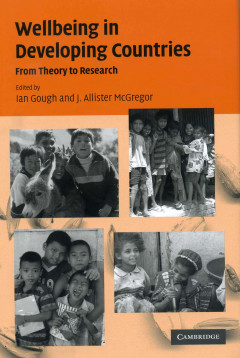
Wellbeing in developing countries : from theory to research
In a world where many experience unprecedented levels of wellbeing, chronic poverty remains a major concern for many developing countries and the international community. Conventional frameworks for understanding development and poverty have focused on money, commodities and economic growth.
- Edisi
- -
- ISBN/ISSN
- 978-0-521-85751-2
- Deskripsi Fisik
- xxiii, 399 p. : ill. ; 23 cm.
- Judul Seri
- -
- No. Panggil
- 306.091724 WEL

Comparative politics of the Third World
- Edisi
- -
- ISBN/ISSN
- 1-58826-166-2
- Deskripsi Fisik
- xii, 538 hal. ; ill. : 26 cm
- Judul Seri
- -
- No. Panggil
- 320.3 GRE c
- Edisi
- -
- ISBN/ISSN
- 1-58826-166-2
- Deskripsi Fisik
- xii, 538 hal. ; ill. : 26 cm
- Judul Seri
- -
- No. Panggil
- 320.3 GRE c
Masih ada jalan lain
- Edisi
- -
- ISBN/ISSN
- 979-461-086-0
- Deskripsi Fisik
- -
- Judul Seri
- -
- No. Panggil
- -
- Edisi
- -
- ISBN/ISSN
- 979-461-086-0
- Deskripsi Fisik
- -
- Judul Seri
- -
- No. Panggil
- -
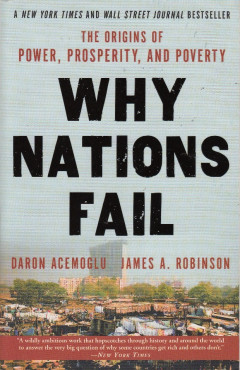
Why Nations Fail : The Origins of Power, Prosperity, and Poverty
Why are some nations rich and others poor, divided by wealth and poverty, health and sickness, food and famine? Is it culture, the weather, or geography that determines prosperity or poverty? As Why Nations Fail shows, none of these factors is either definitive or destiny. Drawing on fifteen years of original research, Daron Acemoglu and James Robinson conclusively show that it is our man-made …
- Edisi
- -
- ISBN/ISSN
- 978-0-307-71922-5
- Deskripsi Fisik
- 529 hlm. ; 21 cm.
- Judul Seri
- -
- No. Panggil
- -

Parliaments as peacebuliders in conflict – affected countries
This books draws on deliberations and papers delivered at a number of study groups and conferences jointly organized on this topic over the past three years. These Finding are supplemented by specially commissioned chapters. The aim of this volume is to outline some of the strategies parliaments and parliamentarians can adopt to reduce the incidence of conflict and effectively manage conflict w…
- Edisi
- -
- ISBN/ISSN
- 978-0-8213-7579-2
- Deskripsi Fisik
- xvi, 237 hal. : il. ; 27 cm
- Judul Seri
- -
- No. Panggil
- -

Exporting services : a developing country perspective
The past two decades have seen exciting changes with developing countries emerging as dynamic exporters of services. Technological developments now make it easier to trade services across borders. But other avenues are also being exploited: tourists visit not just to sightsee but also to be treated and educated, individual service providers move abroad under innovative new schemes, and some dev…
- Edisi
- -
- ISBN/ISSN
- 978-0-8213-8816-7
- Deskripsi Fisik
- xxii, 379 hal. : il. ; 25 cm.
- Judul Seri
- -
- No. Panggil
- -
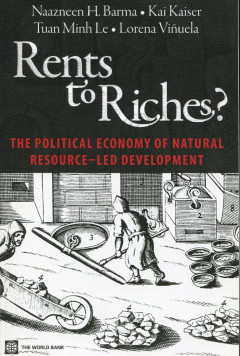
Rents to riches? : the political economy of natural resource-led development
Rents to riches on the political economy of the detailed decisions that governments make at each step of the natural resource management value chain. many resource-dependent developing countries pursue seemingly short sighted and suboptimal policies when extracting, taxing, and investing resource rents. The book contextualizes these micro-level outcomes with an emphasis on two central politica…
- Edisi
- -
- ISBN/ISSN
- 978-0-8213-8480-0
- Deskripsi Fisik
- xix, 276 hal. : il. 25 cm.
- Judul Seri
- -
- No. Panggil
- -

Kamus dunia ketiga
- Edisi
- -
- ISBN/ISSN
- 979-553-373-8
- Deskripsi Fisik
- -
- Judul Seri
- -
- No. Panggil
- -
- Edisi
- -
- ISBN/ISSN
- 979-553-373-8
- Deskripsi Fisik
- -
- Judul Seri
- -
- No. Panggil
- -

Kamus dunia ketiga
- Edisi
- -
- ISBN/ISSN
- 979-553-373-8
- Deskripsi Fisik
- xxii, 876 hal. ; 21 cm.
- Judul Seri
- -
- No. Panggil
- -
- Edisi
- -
- ISBN/ISSN
- 979-553-373-8
- Deskripsi Fisik
- xxii, 876 hal. ; 21 cm.
- Judul Seri
- -
- No. Panggil
- -
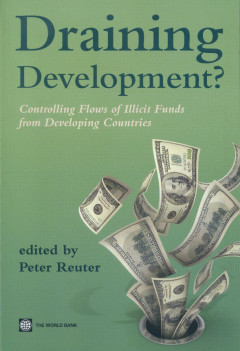
Draining Development: Controlling Flows of Illicit Funds from Developing Coun…
Draining Development provides the first collection of analytic contributions on illicit flows. It assesses what is known about the composition of these flows, the processes that generate them, the role of tax havens in facilitating them, and the effectiveness of programs aimed at either preventing the flows or locating and recouping them once they have left. Drawing on the expertise of prominen…
- Edisi
- -
- ISBN/ISSN
- 978-0-8213-8869-3
- Deskripsi Fisik
- xvi, 531 p. : il. ; 23 cm.
- Judul Seri
- -
- No. Panggil
- 364.133 DRA
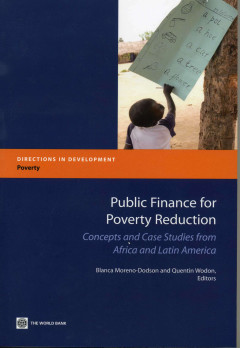
Public finance for poverty reduction
Public finance for poverty reduction examines public finance’s role in reducing poverty through case studies from Africa and Latin America. The findings show that the most important instrument for providing the poor with opportunities, empowerment, and protection is not public revenue policy, but rather the resources channeled through public spending programs.
- Edisi
- -
- ISBN/ISSN
- 978-0-8213-6826-8
- Deskripsi Fisik
- xxvi, 474 hal. : il. ; 23 cm
- Judul Seri
- -
- No. Panggil
- -
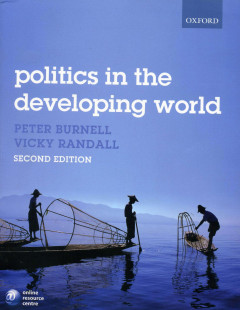
Politics in the developing world
This text book brings together key scholars to introduce students to politics in the developing world. Theoriticall and conceptual chapters are folowed by a carefull selection of case studies
- Edisi
- ed. 2
- ISBN/ISSN
- 978-0-19-929608-8
- Deskripsi Fisik
- 552 hal. : il. ; 28 cm.
- Judul Seri
- -
- No. Panggil
- -

Lessons for the Urban Century
This book provides insights into how best to meet that challenge, based on evidence from the world bank's operations supporting decentralized urban infrastructure financeover nearly30 years around the world. From this varied and rich set of experiences emerge lessons learned, suggestions for the future, and an agenda for future work.
- Edisi
- -
- ISBN/ISSN
- 978-0-8213-7524-2
- Deskripsi Fisik
- xxvi, 92 p. : il. ; 23 cm.
- Judul Seri
- -
- No. Panggil
- -

Environmental Health and Child Survival
More than 40 percent of the global burden of disease attributed to environmental factors falls on children below five years of age, who account for only about 10 percent og the world's population (who 2007b). In large populous areas in south asia and sub-sahara africa, where environmental health problems are especially severe, malnutrition in young children is rampant.
- Edisi
- -
- ISBN/ISSN
- 978-0-8213-7236-4
- Deskripsi Fisik
- ix, 209 hlm. : il. ; 23 cm.
- Judul Seri
- -
- No. Panggil
- -

Data Against Natural Disasters
Data Against Natural Disasters seeks to provide the analytical tools neede to enchane national capacity for disaster response. The editors and authors begin with an overview that summarizes key lessons learned from the six country case studies in the volume. Next, they outline the data needs that arise at different stages in the disaster response and explore the humanitarian community's efforts…
- Edisi
- -
- ISBN/ISSN
- 978-0-8213-7452-8
- Deskripsi Fisik
- xx, 316 p. : il. ; 23 cm.
- Judul Seri
- -
- No. Panggil
- -
 Karya Umum
Karya Umum  Filsafat
Filsafat  Agama
Agama  Ilmu-ilmu Sosial
Ilmu-ilmu Sosial  Bahasa
Bahasa  Ilmu-ilmu Murni
Ilmu-ilmu Murni  Ilmu-ilmu Terapan
Ilmu-ilmu Terapan  Kesenian, Hiburan, dan Olahraga
Kesenian, Hiburan, dan Olahraga  Kesusastraan
Kesusastraan  Geografi dan Sejarah
Geografi dan Sejarah